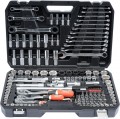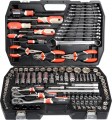Total number of items
The total number of core items included in the set.
In this case, the main items are all devices that are directly used during work: non-separable tools (traditional wrenches, hammers, pliers ...), elements of collapsible tools (for example, a ratchet for removable heads and 5 such heads will be considered 6 units) , as well as accessories (such as extensions or universal joints). Additional accessories — such as lights — may or may not be included in this count, depending on the manufacturer; however, there are usually few such accessories, and they do not fundamentally affect the total number of items.
The most modest modern tool kits include
up to 25 units. However, such kits are very popular — they are inexpensive and at the same time can be very versatile.
25 – 50 items is still quite a small number,
50 – 75 pcs can be called an average,
76 – 100 items are more than average, and the most extensive modern sets can include
100 – 150 items or even
more.
The general rules for choosing this parameter are obvious: a more extensive set, usually, is more multifunctional, but more expensive, weighs more and takes up more space. It is also worth bearing in mind that with a similar number of items, the specific assortment of these items in differ
...ent sets may be different; so when choosing, it is worth specifying not only the number of tools, but also their specific composition.Square drive size
The size of the "seat" for which the socket heads included in the package are designed (see below), in other words, the size of the square hole on the back of the head used for installation on a ratchet, wrench or other similar tool. Accordingly, the tool for working with heads supplied in the kit has the same dimensions of the landing square; and in the absence of such tools in the kit, data on the size of the heads will be useful for its selection.
There is a generally accepted standard for these sizes, providing for the designation in fractions of an inch — from 1/4 "to 1". Thanks to this, heads and tools from different sets can be quite compatible — just matching in size is enough. Most often in modern hand sets there are options in 1/4 "and 1/2", a little less often — 3/4" and 3/8". Some sets include several variants of the landing square at once.
Socket heads (6 points)
Number of
hex sockets included in the tool kit.
All end heads are accessories for a collapsible tool; during operation, they are mounted on a ratchet, wrench or other similar device. The head itself has the appearance of a characteristic “cap”, which, during operation, is put on a bolt, nut, etc. This design, among other things, allows you to work with parts located in recesses and some other hard-to-reach places that cannot be reached with open-ended, captive or split keys. And compared to a set of classic socket wrenches, the holder plus socket set takes up much less space, providing almost the same functionality.
As for the 6 faces, this type of socket head is the most famous and widespread, because. most modern nuts and bolts have this shape.
Socket heads sizes (E-profile)
Working size range of E-profile sockets (see above) supplied with the kit. This parameter allows you to evaluate how the heads fit the dimensions of the fasteners with which they are planned to be used.
Bits
The number of
bits supplied with the tool kit.
A bat in this case is called a working nozzle, which plays the role of a screwdriver tip; in fact, they are most often used with screwdriver handles (see above).
Many types of splines (slots) are used in modern fasteners — starting with the well-known
straight, cross-shaped (
Phillips and
Pozidriv),
Torx sprockets and ending with exotics like Torq-set (a cross with lines shifted from the centre), Pentalobe (with five ledges), etc. .P. In addition, the size of the slots can also vary, and in many cases, tool matching in size is very important. Accordingly, the more bits supplied with the set, the more versatile it is, the higher the probability that it will contain a nozzle of the desired type and size. However, the specific list of bits in the kit also does not hurt to clarify — in order to make sure that it has all the varieties you need. In the characteristics of individual sets, these data are given in the paragraph "Bit sizes" (see below).
Adapter
An adapter for docking seemingly incompatible elements from a set. For example, socket heads with an unsuitable landing square on a ratchet, screwdriver handle or in a drill driver.
The adapter provides full-fledged work with all the required list of tools from the set.
Ring wrenches
The number of
ring wrenches supplied in the kit. Note that some modern kits include
only ring spanners, without any other fixtures or accessories.
The working profile of the ring wrench has the shape of a ring; the inner surface of this ring, in direct contact with the fastener, has the shape of a polyhedron or "asterisk"; Such a wrench covers the fastener from all sides, which provides an even distribution of the load and better suitability for working with high forces than open-end wrenches (see above). At the same time, cap tools are less versatile: if the shape of the part does not match the working profile or if this part is located in a hard-to-reach place, serious problems can arise during work. In addition, they are not applicable to work with fastening hoses, pipes and other similar items — unless such an item is fixed only on one side, and on the other, a key can be put on it.
Note that most often modern box wrenches are made double-sided, with working profiles of different sizes at different ends. As for the quantity, it is worth considering here: sets with the same number of keys of the same type may differ in the specific sizes of these tools. Such nuances should be clarified before buying separately.
Wrench sizes
Dimensions of the wrenches supplied in the set. Specified as a range — from the minimum to the maximum size. In this case, the specific distribution of different types of keys over the range may be different. An example is the following set: 17 open-end wrenches, 5 box wrenches, size range 6 – 24 mm. In such a set, box wrenches are almost guaranteed not to cover the entire range of sizes, but for open-end wrenches, this is quite likely. Such details can be specified separately.
Also note that a wrench size of
24mm or more is considered quite large for today's general purpose tools. However, on the market you can find sets that include wrenches for
27 mm,
30 mm and even
32 mm.
Ratchet
The presence of
a ratchet mechanism in individual wrenches from the set.
The general principle of operation of such a mechanism is as follows: the key works only when moving in one direction. When turning in the other direction, the part that the tool acts on remains stationary, and the working part of the key rotates relative to the handle with a characteristic crack (hence the name "ratchet"). Such a design provides additional convenience when working: instead of moving the key or turning it a full 360°, it is enough to swing the tool back and forth in a relatively small range.
In wrenches, a ratchet mechanism is usually equipped with a ring tool or a ring part of a combination wrench (see above for both types of tools). This mechanism looks like a characteristic insert in the ring. Switching from unscrewing to tightening and vice versa can be done in different ways: in some cases, it is enough to turn the key over, in others, you need to use a built-in switch (usually in the form of a characteristic lever). As a rule, a ratchet (if available) is installed in all ring or combination wrenches from the set.
We would like to emphasize that such devices should not be confused with ratchet wrenches. Specifically, here we are talking about fixed-size wrenches equipped with a ratchet mechanism, while a "ratchet wrench" (see below) in our catalog refers to a handle for socket heads and other replaceable attachments.

